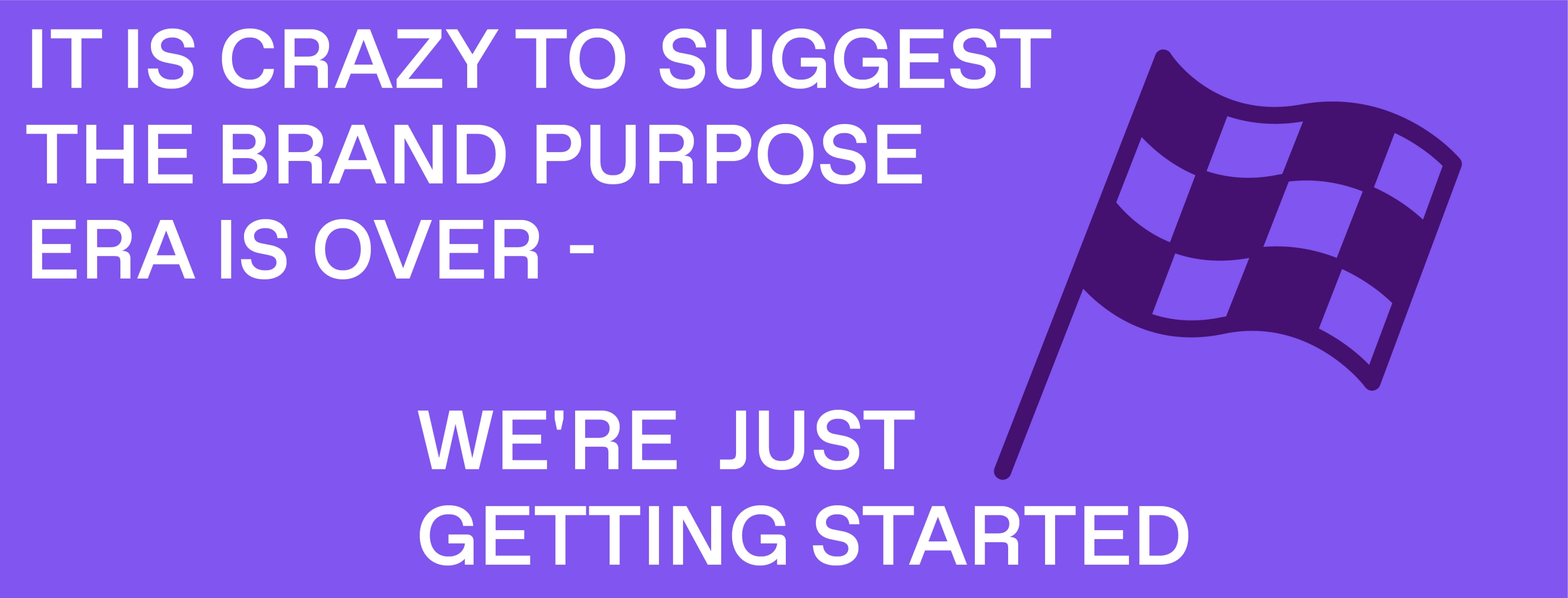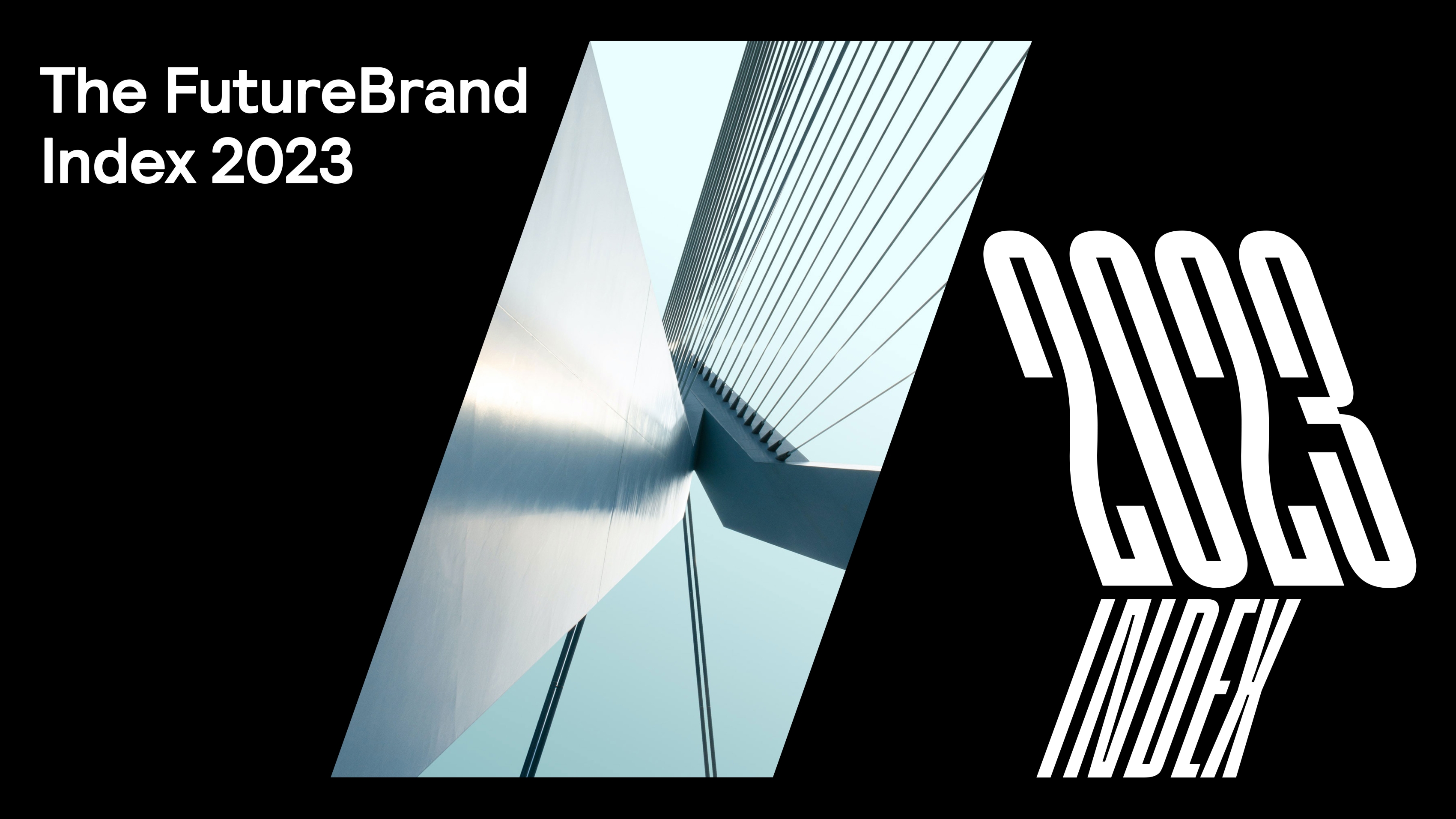

It is crazy to suggest the brand purpose era is over – we're just getting started
Jon Tipple, FutureBrand's Global Chief Strategy Officer, reacts to the news that Unilever’s new CEO Hein Schumacher plans to stop “force-fitting” purpose on the company’s brands...
Well, the call has certainly ruffled feathers.
At one end, you’ve got the critics throwing daggers at Schumacher for seemingly rowing back on purpose when concerns around climate change and social equity have never been greater. At the other end, you have people standing eagerly with their shovels, ready to declare purpose dead and buried. When Schumacher first took on the role, it was hard to see what way he’d go.
The enthusiasm of the latter group isn’t exactly surprising. The marketing community has an incredibly short attention span – journalists and LinkedIn experts want the next headline, and marketers want the next holy grail. As an industry, we get bored easily.
But to suggest we’re at the end of the purpose era is as crazy as suggesting we’re at the end of the sustainability era. We’re only at the end of the beginning.
The problem is that we’ve become far too basic in our idea of purpose. We’ve pigeon-holed it into this very virtuous, do-good thing. It’s this tightly defined view of purpose Schumacher was taking aim at – and I agree with him. Not every brand is here to save the planet or deliver social justice.
That doesn’t mean purpose is dead. What it means is that we need to recalibrate our thinking around what is actually a very nuanced space.
All brands have a reason to exist. Otherwise, they wouldn’t. That’s all a purpose is, and there are plenty of brands, from ice-cream to cosmetics to toys, whose sole purpose is to provide pleasure, comfort or fun.
We must get used to the idea that all brands need a purpose, but that purpose doesn’t have to be super virtuous. It can be utterly sinful, and that’s fine too.
This is what I mean when I say we’re at the end of the beginning. As an industry, we’re finally moving beyond this simplified view into a new era of purpose, defined by maximum transparency, high levels of authenticity, and doing exactly what you say you do.
For some brands, that will mean protecting the environment or saving lives. But for others, it will mean delivering an indulgent and pleasurable experience without pretending to do otherwise.

Avoiding the ‘purpose void’
This shift began to take shape in the FutureBrand Index 2023, our annual study, which reorders PwC’s top 100 companies according to their perception strength, rather than financial clout. Our global research partner, QRi Consulting, interviewed more than 3,000 professionals worldwide for an informed opinion on the world’s most prominent corporate brands, from CEOs and top-level civil servants to skilled professionals.
Brands that align purpose with tangibly positive impact topped the ranking this year, including the likes of NextEra Energy, which develops renewable energy solutions, and CATL, whose EV batteries enable the future of green transport.
But it’s not just those brands whose primary purpose is delivering sustainability solutions that jumped up the list. Unilever and Nestlé were both high fliers this year.
Yes, both businesses have prioritized sustainability in recent years, but it’s not their reason to be. What they do is produce trustworthy, reliable, and accessible consumer products that are needed daily by people around the world, whether to provide a moment of indulgence or meet our basic cooking and washing needs.
Across their portfolios, Unilever and Nestlé touch billions of people with their brands. Brands will benefit from a solid social or environmental purpose within that spread. Dove’s work to help girls build positive self-esteem has proved particularly effective, while soap brand Lifebuoy advocates for better hygiene habits and democratized cleanliness. Nestlé’s Blue Bottle Coffee was created to source its beans from sustainable coffee farms.
These examples all make sense, and the brand’s connection to its purpose is obvious. Because of that, Dove and Lifebuoy are two of Unilever’s fastest-growing brands, something Schumacher pointed out himself. “When done well and with credibility, [brand purpose] can be highly effective,” he said on a recent investor call.
For other brands, like Unilever’s Magnum ice-cream or Nestlé’s Häagen-Dazs, it’s enough to lean into the taste and indulgence. That’s meaningful in its own way.
Trying to shoehorn a virtuous purpose on to these brands is where Unilever has received criticism before, and that’s what Schumacher is trying to rectify. You will get called out if you’re frivolous about purpose and do it without integrity. You’ll fall into what we at FutureBrand call the ‘purpose void’ - a place where an ever more informed and enquiring public dismisses companies that fail to practice what they preach.

ESG and purpose are not tied together
None of this is to say it is essential that businesses work to better themselves from an environmental, social and governance (ESG) perspective. That’s table stakes for all companies now – especially the E. However, brands can be sustainable and have a purpose that’s all about luxury at the same time.
Again, Schumacher pointed out that all Unilever brands will continue to be “full active participants” in the company’s overall sustainability objectives, which it still plans to pursue.
When looking at the S and the G in ESG, things become less clear – i.e. how organizations contribute to society and manage their governance. As we saw in the FutureBrand Index, that’s where a lot of public scrutiny is currently centered and where many businesses risk falling into the purpose void.
A critical factor holding brands back is arguably the need for a standard metric in ESG. People understand healthy living and weight management, for example, because there are calories on the back of a packet that we can count. As I like to say, what gets measured gets managed. But there is no universal measure for societal contribution and a well-governed company.
It could be empowering and liberating if we had a ‘back of the packet’ for ESG, in which every company scored against each letter. Companies would stop tactlessly introducing a virtuous purpose statement, as they’d be able to see precisely where they fall short of delivering it.
But we’re a million miles away from that right now. In the meantime, brands must use self-reflection and marketing prowess to determine where the lines between ESG and purpose should blur as we enter this new era. Unilever is already making a good start.
Therefore, I expect Unilever to do well again in next year’s FutureBrand Index ranking. Any company that stands up and takes a sophisticated view of purpose will likely demand a higher degree of attention moving forward because so many companies out there don’t live up to the purpose they claim to have.
Many forces shape the performance of a brand and organization, but you give yourself the best chance of succeeding if you are upfront and transparent about what you are trying to do.
And with the cost of living crisis, high geopolitical tensions and the AI boom, there’s much for people to worry about right now. More than ever, we need brands that exist for unadulterated fun and pleasure, too.
Schumacher’s challenge now is to identify which Unilever brands should carry on with their virtuous purpose strategies and which should put them aside. If he gets it right, he’ll increase business efficiency and avoid the looming purpose void.
But to anyone who says the purpose era is over, you’re way off the mark. The next new thing isn’t getting rid of purpose; it’s taking purpose beyond what it is today.
This article was first published by The Drum on 30 November 2023.
Related articles

Netball World Cup 2027 appoints FutureBrand & Octagon to build brand strategy, identity and experience
FutureBrand and Octagon get ready to build the brand for Netball World Cup 2027 and break new ground for netball globally.

A new brand for low vision
Guide Dogs NSW/ACT and FutureBrand collaborate to launch a new brand supporting Australians with low vision.

Why did Google just change its logo?
When Mumbrella discovered that Google had made what seemed to be a small change to its logo this week, we went to Rich Curtis, CEO of FutureBrand Australia, to interpret what that meant in design language. For the record, the change involves the primary colours inside the "G": they used to be separated by hard lines, now they blend into one another with gradients.